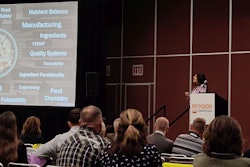
For all the variety of pet foods and treats on the market, the pet food industry itself has very little diversity. At Petfood Forum 2022, the majority of attendees and presenters were of European descent and wealthier than most people on the planet. Especially when considering only companies based in the United States, pet food industry professionals tend to come from similar ethnicities and economic backgrounds. Minority-owned pet food and treat companies are themselves a minority. However, one guest attendee at Petfood Forum may help change that.
“I don’t see many of my people here, but I do see opportunity,” Damien Mayo Jr., a high school basketball player from Bellerive, Missouri, USA, who is Black, told Petfood Industry. “There is potential for new businesses.”
He could see himself starting one of them.
Mayo attended Petfood Forum as a guest of keynote speaker Coach Ken Carter, subject of the movie “Coach Carter.” On the reel and for real, Coach Carter led a group of at-risk youth to both academic and athletic victory. At Petfood Forum, Coach Carter hoped that Mayo and his team would also see an opportunity for success.
“This event is allowing these kids to see something they would never have seen,” he said.
Pet food industry opportunities
Presenting pet food business and career opportunities to minorities may open new pathways for economic success that many may not have considered. On the other side, when a wider range of people work for the company, pet food businesses may benefit from a wider range of viewpoints, opinions, experiences and ideas.
“By me coming speaking, now we have an in-road,” Carter said. “When you have an in-road, you have two things. Now, you can ask the questions and you can be in the meetings. You can ask, why is this this way and why is something that way? Now you can get the answers, you’ve just got to get to the right person. When you get to the right person, you can get the answer. Not all the stuff that people give you, all the fluff, you can actually get the right answers.”
Coach Carter looked for some of those answers himself as he mingled with Petfood Forum attendees. Among the pet food professionals that Coach Carter interacted with, he said he was surprised at how friendly everyone was with each other. Unlike more cut-throat industries, pet industry competitors can still laugh together, and treat each other kindly. Perhaps the animals served by the industry influence the character of the professionals working for pet food and treat companies.
“Everybody in the world loves dogs, I don't care what color you are, what race, everybody loves their dog,” he said. “You could go away for 10 years, but if you treated that dog extremely well, when you come back, they're gonna lick on you like you've never left.
“So that's what this is all about, being kind and generous to everybody you meet and giving them an opportunity.”


















